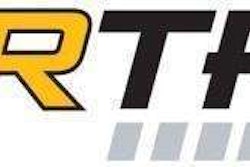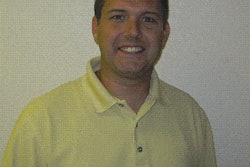John and Sherri Holbrook
Grand Prairie, Texas
These safety-minded contractors dug into a new market to survive the recession.
By Lauren Heartsill Dowdle
The Holbrook Company
Year started: 2000
Number of employees: 105
Annual volume: $14 million
Markets served: Demolition, excavation, drainage, soil remediation, clearing, lime stabilization and grade work
Coach, contractor, father, husband and mentor are all hats John Holbrook wears well on any given day. But one he refuses to put on is that of a worrier. “Worry is the lack of faith that God will take care of your problems,” he says. His refusal to give up in this struggling industry pushed the company into a fairly untouched, profitable market that helped them survive.
Keeping it in the family
A summertime job turned into a contracting career for John, who worked as a project superintendent, vice president and treasurer for other construction companies before starting The Holbrook Company in 2000. When his previous employer sold their company, Grapevine Excavation, John felt prepared to start his own, bringing 45 of the 66 Grapevine employees with him.
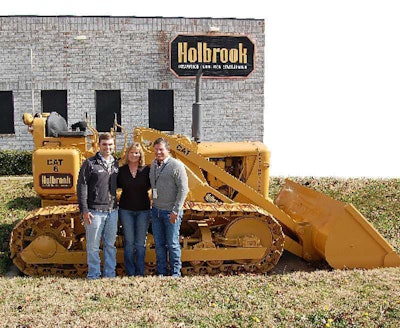 Sherri and John Holbrook, right, plan to hand down the business to their son, Stephen.
Sherri and John Holbrook, right, plan to hand down the business to their son, Stephen.His company now has 105 employees, including a 17-member office staff who are all family or have been coached by John in soccer – something he does before and after hours. His wife Sherri, who started in the construction industry after marrying John 27 years ago, handles the logistics by entering bills, certifying payrolls and “making sure the employees are happy.”
Their son Stephen makes schedules, visits jobsites and learns the ins and outs of the business so he can one day take over. “I love this industry,” Stephen says. “It’s all I’ve ever wanted to do. I’m trying to make a name for myself being the boss’ son.” With his desk next to his father’s, he’s constantly mentored in industry practices.
Dirty work
When the economic downturn hit the Dallas-Fort Worth area in 2008, the Holbrooks began offering soil remediation services, which they already had the equipment and skills to do.
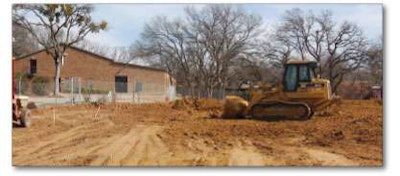
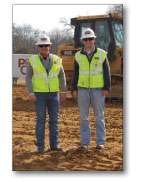 John and Stephen regularly check on their sites’ progress, like this one at St. John the Baptist Greek Orthodox Church in Euless, Texas.
John and Stephen regularly check on their sites’ progress, like this one at St. John the Baptist Greek Orthodox Church in Euless, Texas.Although soil remediation is one focus, the Holbrooks have not let their other services – demolition, excavation, grade work, drainage, lime stabilization and clearing – fall behind. They have seen a shift in where they are getting the jobs, however. Before, their volume was about equally divided between public and private projects. Now, 80 percent of their jobs are public. “We’ll take what jobs we can get,” John says. “The private market will come back.”
The Holbrooks have large repeat customers such as Turner Construction, Andres Construction and Medco Construction, which represent a combined $25 million of past work for them. “Having a customer service-oriented business is a huge piece of the puzzle for keeping customers,” John says. “Our goal is always to make a new customer a repeat customer.”
Rewarding practices
Another factor in keeping repeat customers is maintaining sound safety practices. “Large companies will go with the safer contractor, even if the bid is higher,” he says. John stresses safety by hosting weekly meetings, where he uses materials in both Spanish and English, and encourages employee feedback. “Safety is a huge part of our success,” John says. “Even in tough times, we haven’t had trouble with safety. We’ve proven safety doesn’t cost – it pays.”
 The Baylor Health Care System is one of the Holbrook’s repeat customers.
The Baylor Health Care System is one of the Holbrook’s repeat customers.And employees have seen these payments firsthand. They receive up to four $500 bonuses a year if they do not accumulate safety penalties, with their peers deciding the penalty severity and fine amount. “Wearing safety vests with their names on them, hard hats and protective glasses has become a way of life for our employees,” John says.
If there is an accident, everyone comes together to analyze what went wrong and how they can prevent it in the future. Employees must also go through background checks and nine drug tests a year, which further cuts down on safety issues and maintains their 0.71 experience modification rate.
Keep employees happy
Although safety comes first, employee happiness is a close second. Since the Holbrooks have been unable to give raises during the recession, they look for other ways to boost employee morale. Sherri takes money out of her personal bank account to give employees presents and small bonuses on Thanksgiving, Christmas and birthdays. “We’re all a big family,” Sherri says. “I want the employees to know they’re appreciated and important. If it wasn’t for them, we wouldn’t be here.”
 The Holbrooks demolished an existing structure, excavated, graded and stabilized lime for a 120-animal facility at Carrollton Animal Services.
The Holbrooks demolished an existing structure, excavated, graded and stabilized lime for a 120-animal facility at Carrollton Animal Services.Gary Walters, Holbrook’s chief estimator and Sherri’s brother, has worked for John for 14 years and says the work environment is one of a kind. “John took me under his wing and has been a good mentor,” Walters says. “I’ve never been in a job like this before where I enjoy coming to work. I will go for months without talking a day off. I want to work for us to survive.”
Profitable equipment
This love for their job can also be tied to the sense of ownership employees have for the equipment. John assigns each operator a machine, making them accountable for its upkeep. “The more time you can keep one guy on one machine, the more profitable it will be,” John says. “The operator will want to take care of his machine and have more pride in it.”
The company stopped renting equipment in 2008 and now only buys. John says the equipment is an important investment and tries to keep each piece as long as possible. Their fleet includes excavators, motor graders, articulated dump trucks, compact track loaders, box blades, backhoes, mixers and compactors.
The Holbrooks’ equipment efforts are not going unnoticed. Jerry Crawford, vice president of Turner Construction, has worked with the Holbrooks for about six years. “We usually have them on two or three projects at a time, and you can always tell their equipment from the other contractors because it looks so good,” Crawford says.
The Holbrooks never have equipment-related downtime, says Chris Sinkey, owner of J&H Truck Service. “We’re one of the larger truck companies in Dallas, and we deal with a lot of companies,” Sinkey says. “Hands down, they’re the best. The way John runs his business is the reason guys last in this business.”
And John intends to last, with his determination to succeed showing no signs of stopping. “You can do more than you think you can,” he says. “Always dream bigger.”
Tips for survival


